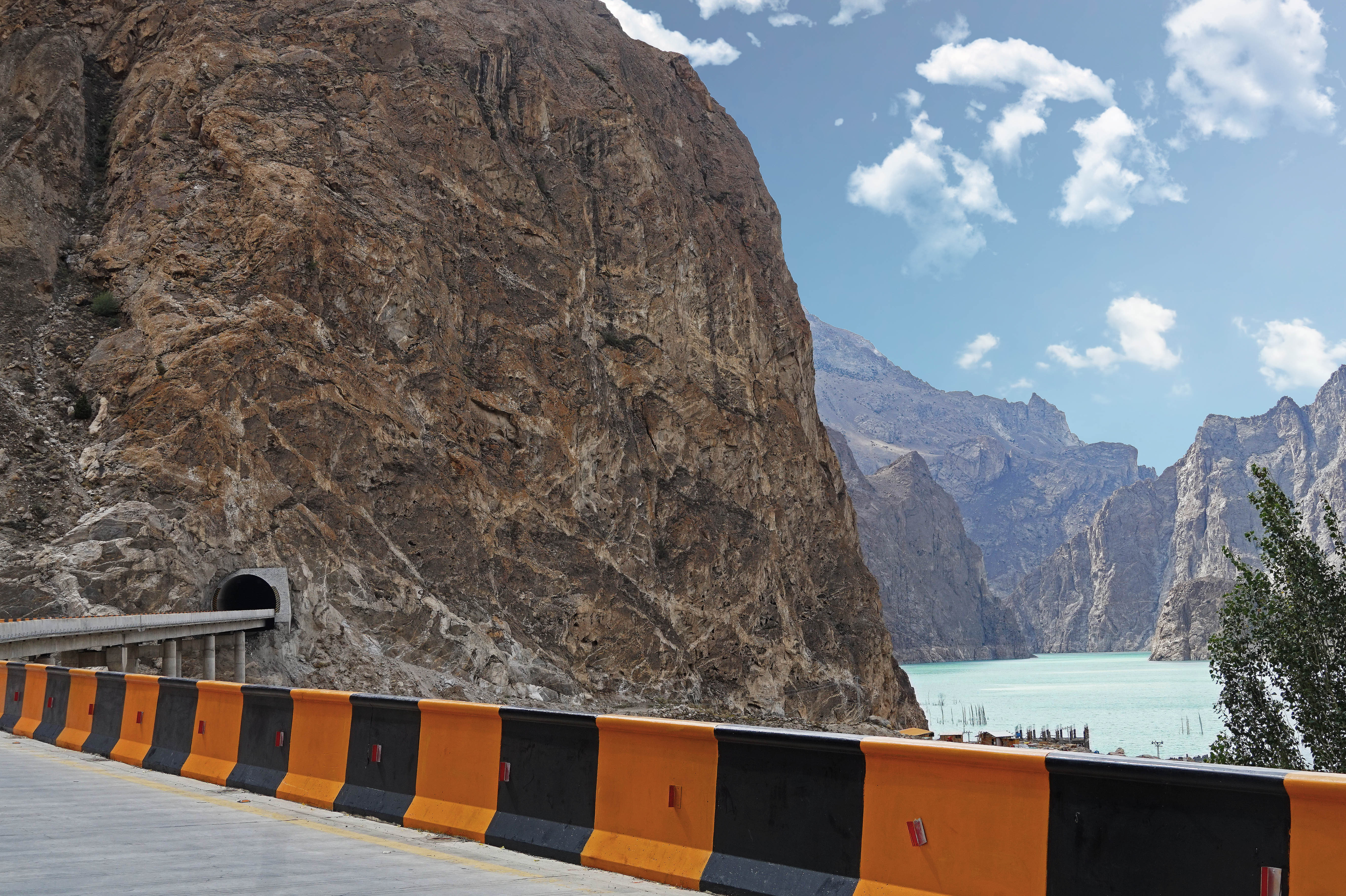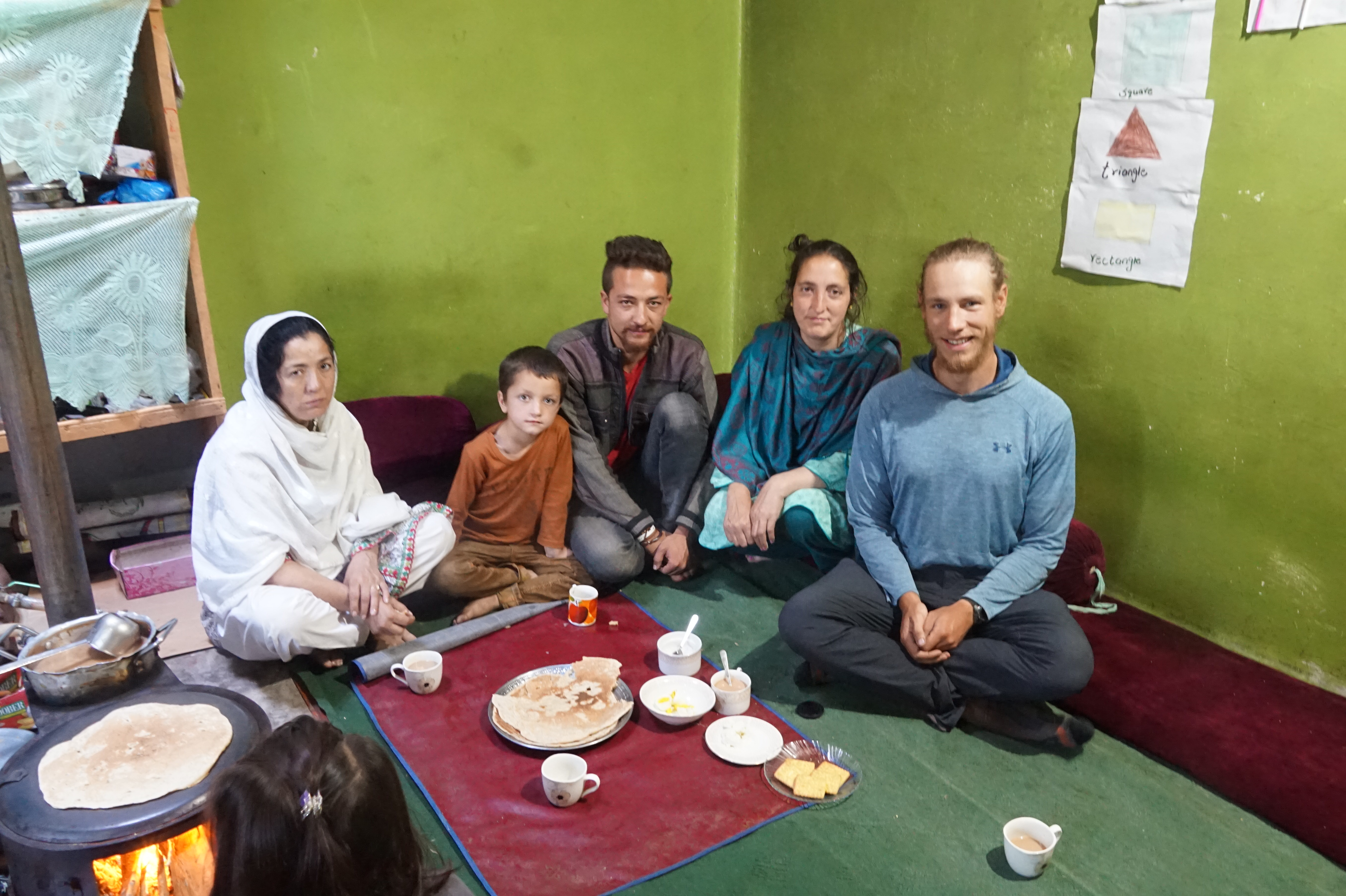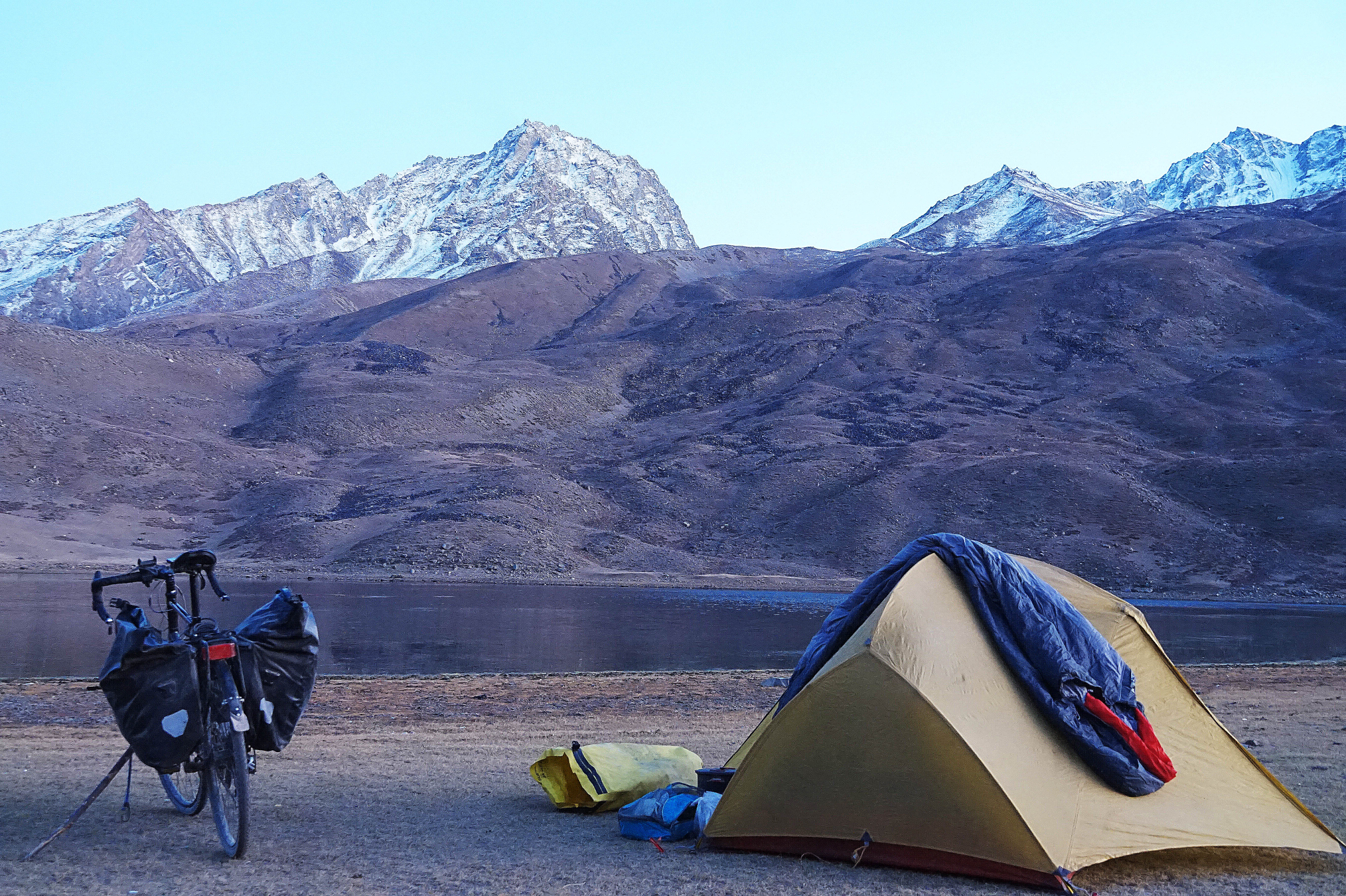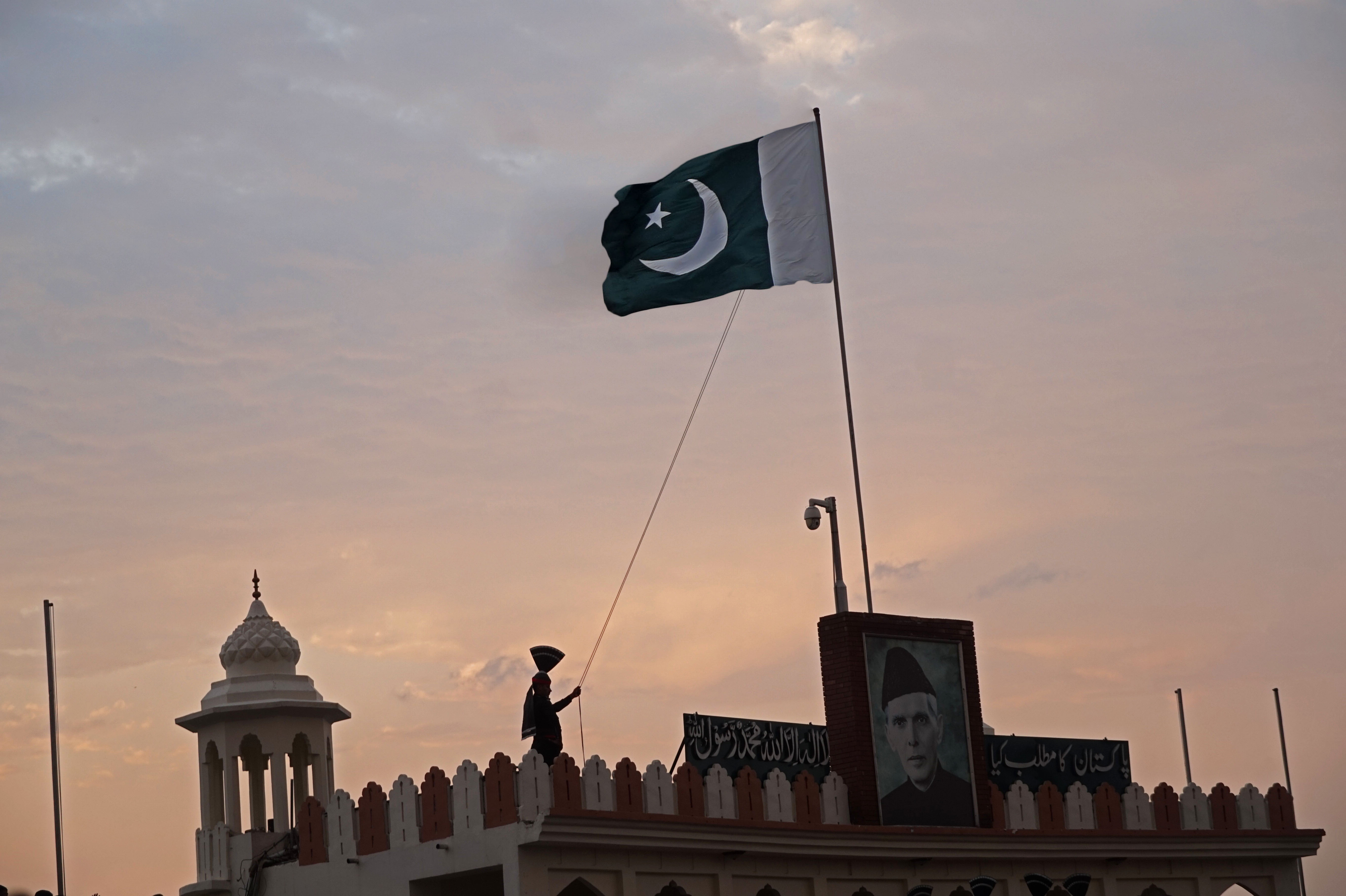Chai and a Chat
May 17th, 2020
The compulsory van was packed tight with fifteen people and fifteen people’s worth of luggage. On top of the van, a teetering mound of goods bought in China swayed along with, I hoped, my bicycle that was still strapped down. I was sweating, the men rubbing against me were sweating, and the immovable heater was blowing directly at me. But I didn’t mind that. My legs weren’t trembling on a bicycle, and I was finally free of the Chinese police’s bizarre grip.
The van paused as we came to a group of officers at the official crossing. A grand marble archway marked the Khunjerab Pass and the highest border crossing in the world at 4693m (15397ft). The Chinese side of the archway was empty, save for the few officers, but the Pakistani side was a tourist spectacle, even equipped with the self-proclaimed “highest ATM in the world”. This archway not only acted as a border between two nations but also a border between two entirely different ways of life. Through this archway lie societal, religious, ethnic, economic, and geographic change. I wondered how this change would affect my trip.
At the van’s final stop, I walked out to the small Pakistani village of Sost. Lounging locals with seemingly nothing to occupy their time with looked on as I made my way to the immigration office. I presented my passport to the two officials with a daft smile. They examined my visa and whispered conspicuous scrutinies to each other. I really hoped they wouldn’t notice, or rather, wouldn’t care, but you didn’t have to speak Urdu to know an entry stamp wasn’t coming easy.
Six months prior I resubmitted my passport to the granting Pakistani embassy for them to correct too-early visa dates. The embassy’s brilliant solution was to whiteout over the "Jul 19" date and sloppily pen in "Nov 19" over top.
“Why did I even bother letting the embassy officials make that change? I could have done that myself!”, I thought.
Of course, the immigration officials think I did do that myself. I didn’t know the laws of Pakistan, but I imagined that visa fraud wasn’t particularly legal, so I launched into a ramble trying to explain the situation.
"It wasn't me, it was the embassy, I promise" didn't seem to be moving them.
They convened in a back room with an older man bearing double the amount of stars and patches on his uniform. I could see the officials having a debate, with the older man giving the final say. The two disgruntled officials walked back to me. Turns out, it would take a lot of effort on their part to confirm or deny my story, and, turns out, they were pretty busy today and really didn’t care that much after all. The officers stamped me into Pakistan.
I set off from my hotel the following morning headed southward along the Karakoram Highway, a joint construction venture between the governments of Pakistan and China. Its roads—Chinese standard roads, smoothly paved and painted—were impressively forced into the sides of the surrounding mountains. My ass thanked the cooperation of the two governments as I glided along.
The morning clouds parted and the sun illuminated the Karakoram mountains in the distance. The mountains were different here. They stood grey and jagged, surrounding me on all sides and at all times. They were taller, steeper, and more in your face. I kept an eye on these mountains as I rode through the valley, their snowy caps drawing lower and lower by day. Though it was still fall, winter was already rearing its ugly head over the mountains. The air was getting crisper, temperature getting cooler, and breath getting more noticeable. A scattering of mountain passes lay on the southward roads ahead of me. I’d need to make it through these passes before the way became untraversable by snow if I hoped to connect with the rest of Asia. I didn’t have much time to waste.
Winding my way through the valley, I came to Attabad Lake with its still water gleaming and glistening in the sun. The lake's color was that extra kind of blue, a turquoise flavor that you only see in photos of exotic travel destinations. On the other side of the lake, I saw as the nearby mountain swallowed the road into a pitch dark tunnel. I approached the entrance of the tunnel to see what was once a fully lit, fully ventilated marvel of modern infrastructure was now an OSHA nightmare. Crawling forward into the belly of the mountain, my headlamp beamed a cone of light and illuminated the dust and fumes hanging in the air. Deep within the tunnel, I halted and turned off my headlamp. The click of a button encompassed me in blackness, in some sort of spectral void, it seemed. I had never known such a stark removal of the senses before: a complete absence of light and of sound. I stared into the void with an empty mind. Strangely, it felt not frightening, but calming. Within this mountain I was away from all the troubles of the outside world, perhaps I could just fade away into a blissful nonexistence. But, the time wasn't now. The flashing lights, amplified horns, and suffocating fumes of a dump truck entering the tunnel crescendoed its way towards me until the cacophony ripped me from my comforting void—from one extreme to another in an instant, a common theme of the road.

I emerged from the tunnel and sped towards the city of Gilgit, the capital of the Gilgit-Baltistan region. On the outskirts of the city, the quiet mountain roads turned to bustling market streets. I had many curious onlookers as I wandered, and I inquired where I could find a place to sleep. They agreed to show me to a local hotel, but, of course, chai and a chat were required first. These chai breaks that were ubiquitous with the locals around Asia made connecting a breeze. It seems that all barriers are broken down over a boiling cup of water and dried leaves, and I didn’t mind the caffeine boost either. After our chat, a man led me down the road to what was apparently a hotel. The building was indiscernible from any other around, but it had a room with something to sleep on, something to pee in, no bugs that I could see, and it cost $2.50. It was perfect.
I sat on the hotel rooftop at sunset overlooking the market streets below me, the skirmish of the day resided in sync with the light leaving the streets. As I basked in the quieter atmosphere, a man approached me to join in my overlooking. He sparked up a cigarette, took a drag, and initiated a conversation.
“Where are you from?”, he said with perfect English.
Faiz worked at a local city bank. His formal attire was contrasted by a coating of dust from his walk home and accentuating bags under his eyes. He was relatively young, in his late 20s, but his demeanor showed signs of a long life of hard work. Like all Pakistani people I spoke with, he was happy to see a foreigner in his country.
Our conversation quickly shifted to the politics of the region, and he asked what I knew of the status of Gilgit-Baltistan. I knew little, other than it being a part of the greater disputed Kashmir region. However, I was always eager to learn about the areas that I was in, especially from locals. Keeping bias in mind (and sometimes a bit of blind nationalism), I found locals to be my favorite source of political and historical information. They made the information and issues real, tangible, and not just more words on a page.
Faiz told me of his struggle with the Pakistani government. He, and many others, wished for Gilgit-Baltistan’s independence from Pakistan. As he saw it, its current status of autonomous administration provided all the negatives of being a part of Pakistan and none of the positives. And even if the current Kashmir dispute with India were to be resolved, he wouldn’t wish to become a part of Pakistan. He felt no relation and no allegiance to the people south of him.
“Who are they to lay claim to my home?”, he said with a fiery determination in his eyes.
Faiz lifted the hair on his forehead to show a scar connecting his eye to his scalp. During a protest for independence, the Pakistani police detained him, threw him in a cell, and beat him senseless with their steel-toed boots. A blow to the head partially blinded him, and his vision has never fully restored, even after reconstructive surgery. He’s now cut off all involvement with independence groups due to police surveillance and fear for his life.
I felt ashamed. While I galavanted on a bicycle around this man’s homeland, Faiz fought for his freedom. What could I possibly do or say to show my empathy? I wished him the best of luck with his struggle and went to sleep.
From the city of Gilgit, I reached a crossroads. I was heading towards the capital, Islamabad, and was eager to leave the mountains that I had been in for the past three months. Mostly, I was eager to forgo the requisites of these mountain roads. Constant bucket showers, squat toilets, cold, spotty internet, and climbing makes one long for engrained comforts. I wasn’t proud to admit, but I had caught myself dreaming of Western fast food. But, just as I was to turn onto the road to Islamabad, I received a message from some cyclist friends. Word had it there was a longer road to Islamabad which would take me two weeks out of the way. Apparently, it was less-trodden, more mountainous, and more adventurous. So just like that, I turned west instead of south. The golden arches would have to wait.
I entered the Ghizer Valley headed for the city of Chitral. The late fall season meant all kinds of fruit trees were in bloom. Locals loved weighing me down with gifts of apricots, plums, apples, pears, grapes, mulberries, and pomegranates. “Scurvy be damned”, I thought as I stuffed my face with these juicy delicacies. The season also brought fiery autumnal colors to the slim and tall poplar trees that accented the curves of the river valley. Not that the valley needed any help in looks, northern Pakistan’s beauty was unrelenting. Unfortunately, the integrity of my bicycle did not share the same unrelenting behavior. One too many cracks or bumps or rocks in the road caused the wire gripping my back tire in place to completely blow out. I had no means or knowledge of repair, so I headed days back to Gilgit in search of a replacement.
Back in the city, I met a man, Asif, who made it his job to get me a replacement tire. We spent two days speeding around the city from bike shack to bike shack and tea break to tea break searching for a replacement in vain. In the end, another man, Karim, lent me the tire off his own bicycle for me to use on my trek to Islamabad.
Pakistan had me overwhelmed by the hospitality of its people. I sometimes went days without spending money, my meals and accommodation all provided or paid for by another generous person. My path forward was paved by the assistance, guidance, and encouragement of the people, but a moral qualm was growing within me: I had no way to directly repay this generosity. A smile can only be so big and thanks can only be given so many times before teetering on annoyance. And of course, no money would be accepted by my hosts, not even the poorest of the poor would make an exception. I felt that I didn’t deserve this treatment. “The guest is God”, they told me many times, but I hardly felt like a god. In truth, I could think of few times in my life where I showed my own hospitality to other people. I decided I must adopt their saying, their mentality. For now, and for some time, I was to be the guest, wandering in and out of lives with goodwill following. But, I hoped to have many guests and many gods in my life when my cycling days came to an end.

With my generously donated tire, I bumped back down the valley. The way to Chitral was divided by Shandur Top, a 3800m (12,139ft) mountain pass. The closer I came to the pass, the rockier and steeper the road became. The loose gravel and intense gradient eventually forced me to a grinding push up the mountain on foot. My upper body heaved, legs thrusted, and breath puffed as I exerted all the power my aching body could muster. I burst forward in short bouts, stopped to gasp for air, then repeated over and over until the top finally neared. No mountain pass comes easy, but the elation felt at cresting is always so intoxicating. A cocktail of exercise-induced endorphins, a sense of accomplishment, and altitude dizziness create a high like no other. I’d take mountain climbing over your best drug any day.
The mountain pass was a plateau, barren, mostly, with weaning remnants of summer’s greenery scattering the grounds. But, there was no white to be seen; I had beaten winter. I continued down the now flattened path. Now, the pass was empty, but in the summer months, it was home to the highest polo ground in the world. On what might as well have been another planet, I struggled to imagine thousands of people making the trek up here, setting up shop, and reveling in human sport and festivity.

To my left was a small lake with yaks grazing about. I set up camp nearby and shooed away my shaggy-haired companions as the sunlight drained from the pass. At night the temperature dropped to a numbing number, but that was the price of admission to be camped on the roof of the world. I gazed at the unpolluted sky above as it emerged with a brilliant spattering of stars and planets and nebulas. A prominent Milky Way shined vivid, its band plunging from the apex of the Earth and into the mountain foreground. My neck twinged as I spun and craned to glimpse every corner of the night. I had to take it all in. The sky felt alive, and I with it.
Eventually, the cold overcame me, and I dove for warmth in my tent. The thin layers cocooning me in my sleeping bag promised little for a good night's sleep, but I shut my eyes with a smile on my face. How lucky I felt to be here and now, alone on a mountain with a bicycle, enamored and in wonder with the world.
The next morning I praised the warmth of the sun and set off down the mountain. The rough mountain roads and chilling weather declined as I made my way further and further south. I finally felt that I was entering South Asia, and with that entry came an overpopulation of people. Roads were hectic and dangerous, people were everywhere, and the plague of plastic waste littered the streets and ditches. At all times of the day, people were curious about me and my ragged self. They frequently tried to stop me, ask me questions, or take pictures with me. But the mountains had worn on me, and I needed a break. I went heads down to Islamabad.
In Islamabad, my first stop was a newly constructed mall. After long adventurous periods, my first desire was always some form of modern indulgence. The mall was a standard Western mall, but to my bicycle traveled eye it was grand and luxurious, excessive even. I ate far too much greasy food, watched the latest film at the movie theater, stared in awe at the number of choices at the large supermarket, and met up with some cyclist friends.
After I had my share of decadence and consumption, I started my main task: finessing an Indian visa. Among travelers, this process was known to be laborious, and my mind boggled at its lengthy and convoluted process. I first had to extend my Pakistan visa before I could apply which required a signed letter from some Department of Government. But actually, I didn’t need this letter, I needed a different letter from some other Department of Government. And it would take four days. Then, I couldn’t apply for the Indian visa directly via the embassy, I had to apply through one of two third-party agencies, of which only one actually existed. The list of documents they required ran to my feet: letters, photos, vaccine certificates, forged itineraries, bank statements, copies of travel info, and hotel bookings. And it would take two weeks.
“Two weeks!? That’s impossible!”, I argued. “My Pakistan visa will expire in only one week!" I really couldn’t handle going again to whatever Department of Government for more letters.
With a nuisance-like persistence, I convinced officials to expedite some processes, but the entire slog still lasted three weeks. The majority of the time I spent waiting, wondering, and just being bored. Islamabad wasn’t the most lively city, and I was burnt out. I had little ambition to explore or sightsee, but at the same time, I could feel the stagnancy numbing my mind. To go from everyday vagabonding to life waiting around in cheap hotel rooms is a dangerous thing for the psyche. I needed to break free, to feel the wind of the road and the ache of my legs that so fed my soul once again.
So, with my beautiful Indian visa freshly pressed into my passport, I left the confines of my hotel and packed my bike. But before I set off, I looked behind me. Grand mountains and an even grander adventure shadowed me. Would my life still be adventurous in the dim of this shadow?
I thought of India, and a rising wall of uncertainties and doubts formed in my mind. I knew India would be difficult, a difficulty far different from that of hot deserts or cold mountains. And then I realized that these exact trials and trepidations are the prerequisites for a new adventure. Without novelty and challenge, an adventure can never exist, and without a bit of boldness, an adventure can never occur.
I raised my leg, pressed down on the pedals, and set in motion for India, feeling the wind and the aches once again.
